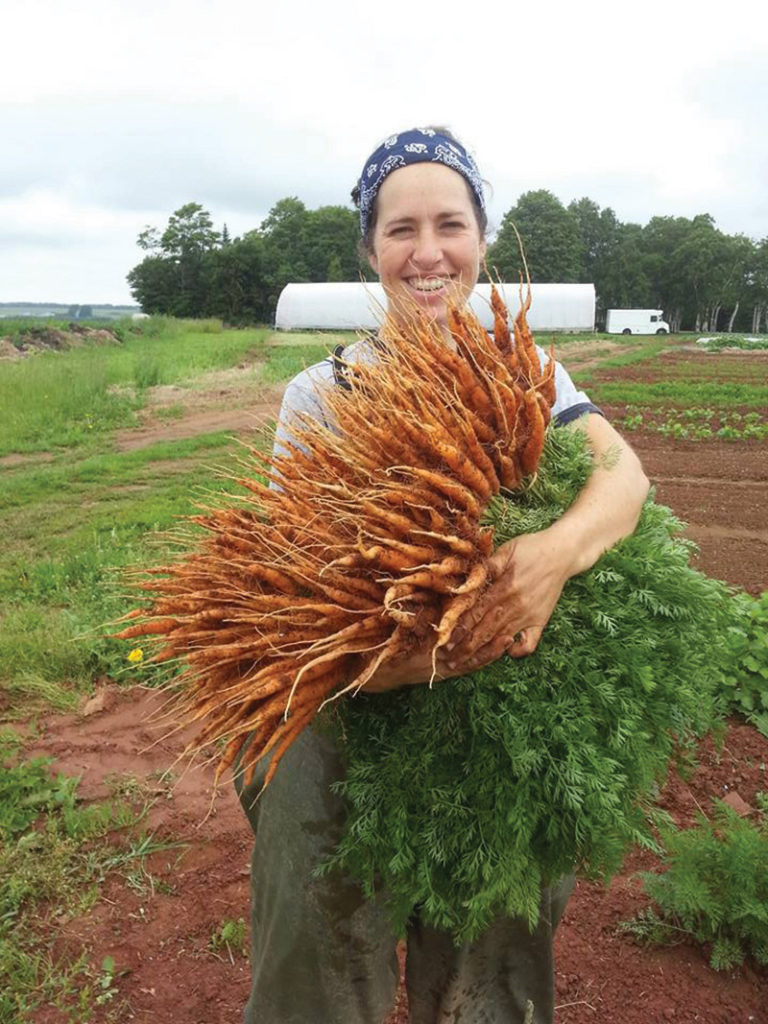Adding zest to your garden and palate
The unsung heroes of the culinary world, a cornerstone of traditional medicine, a dream come true for beginner gardeners and experienced farmers too – herbs are all of these things and more, yet they don’t often get the accolades they deserve. Most of us are familiar with the stars of the herb world – basil, parsley, cilantro and dill – but even then, how much time do we spend ooohing and aaahing over a fresh bunch of the good, green stuff the way we do when we happen upon a pint of fresh, local strawberries or a marbled steak? Not nearly enough, I suspect. And yet, without herbs, life would be quite dull – like a party without music or champagne without the bubbles.
My own love affair with herbs began in earnest last summer. Perhaps I’d discover I had inherited my mother’s green thumb. Experiments with house plants suggested it was a recessive gene that had skipped me, but I reasoned that growing actual food was a slightly different proposition than keeping ornamental green things alive indoors. And besides, my houseplants hadn’t exactly died, they just hadn’t, erm, thrived.
I wanted to stack the deck in my favour, so I went to the annual Herb Day at the Farm Centre, knowing that some of PEI’s best organic farmers would be on-hand selling transplants and sharing invaluable knowledge. I stocked up on basil, parsley, mint (yes, mint!), and tarragon transplants, asked a lot of ‘newbie’ questions and ran into many familiar, smiling faces.
Then I headed over to Van Kampen’s Greenhouses to round out my selection with cilantro and rosemary seeds. The staff helped me choose some Miracle Gro fertilizer and gave me tips for keeping my plants well-fed throughout the season. After a quick stop at the supply store for some soil and sheep’s manure, I was ready to plant my herbs in the containers donated to my cause by a good friend.
The first few days after planting my little green ‘babies’, I watched in wonder and awe. One morning, I checked on the planter boxes I’d used for direct seeding the cilantro and rosemary and they’d come alive with bursts of green. I started jumping for joy and crossed my fingers they were the real deal, not the dreaded enemy of all gardeners, weeds. As it turned out, my finger crossing worked and I was soon harvesting from every container on my deck.
My summer adventures in herb growing ended up being quite bountiful. It turns out you really can’t fail when it comes to growing mint. The basil plants thrived on my sheltered back deck, where they enjoyed the full heat of the sun all day and happily accepted their weekly feedings. All of my herbs grew so well, in fact, that I found it difficult to keep up with maintaining them. Finding ways to incorporate them into my lazy summer meal prep required some experimentation, especially with the slightly bitter, anise-like flavours of tarragon.
By the end of the harvest, I’d literally tasted the spoils of my back deck gardening victory countless times. All through the winter I clung to memories of freshly picked basil and tomato salads, crisp cilantro atop curry creations and mint-infused lamb dishes. I missed the magic of walking out the back door, snipping some fresh herbs. and elevating my dinner plate to a whole new level.
As a mildly seasoned herb gardener (pun intended), I’m looking forward to another summer filled with herby goodness. To develop an even deeper appreciation for herbs, I checked in with three of my favourite people to get their take on using and growing herbs in their respective areas of expertise – cooking, farming and natural medicine.
CHEF ILONA DANIEL, food seductress and culinary director at Upstreet Craft Brewing

Chef Ilona Daniel // Submitted Photo
How important are herbs in a chef’s list of ‘must have’ ingredients?
When I was an apprentice, my chef was an Englishman whose response after tasting anyone’s prep was “It needs more ’erbs!” So for me, herbs are absolutely essential. Sea salt, freshly cracked black pepper, and a fistful of herbs is all you really need to make food taste amazing.
What are your favourite herbs to use?
Basil, cilantro, and Italian flat leaf parsley are my herbaceous heroes.
Besides the ‘rockstars’ of the herb world (basil, parsley, dill and cilantro), what other herbs do you feel are ‘must haves’?
I love fresh tarragon and chervil. They both have a delicate anise flavour, and for me evoke memories of happy days with beautiful weather and a sense of well-being.
Which herbs are acceptable in dried format?
Oregano, rosemary, thyme, savory, and mint get my thumbs up in the dried herb category.
What’s the best trick to keeping herbs fresh once they’re in your kitchen/fridge?
Keep them dry. Put some paper towel in the package or roll loosely in paper towel and place in a zipper seal bag. A sharp knife will [also] maintain the integrity of your herbs. Dull knives will bruise and batter the delicate nature of fresh herbs, rendering them a shadow of their former glory.
Anything else you want to share about herbs?
Fresh herbs will truly transform your dishes; grow them in your garden. I always at least double the amount of fresh herbs in a recipe. For example, I’ll easily use the entire packet of basil in a pot of tomato sauce; incredible.
JEN CAMPBELL, organic farmer at Jen & Derek’s Organic Farm (Bedeque, PEI)

Jen Campbell, organic farmer // Submitted Photo
As a certified organic farmer on PEI, what herbs do you generally grow each season for your Community Supported Agriculture (CSA) members?
I have grown a wide variety of herbs over the last ten years, but after feedback from the members I just grow basil, dill, cilantro, and parsley.
Are there certain herbs that are better suited to the Island’s climate?
Most herbs can be grown here and do very well with our Island climate.
Which herbs would you recommend a beginner gardener try to grow?
Easy-peasy would be dill, cilantro, and parsley for sure.
Which herb(s) may be a bit trickier to grow but are worth the trouble?
BASIL! My goodness what would I do without basil in my life? It’s not technically hard to grow, but it can be a bit fussy. Basil loves heat and humidity and I find it grows best in my greenhouse in gallon pots. The trick to getting continuous harvests of basil is proper pruning of the plants. If you don’t prune it, it will just get tall and woody and go to seed. Basil will be very sad if you stick it in a small pot on your deck and let the wind beat it up. Keep it somewhere protected with lots of heat and sun and don’t forget to water it!
What general tips would you give to beginner gardeners when it comes to planting, growing and harvesting herbs?
Direct seeding is way better than from transplants for dill and cilantro, and I like to plant them every two weeks to have continuous supply. Don’t plant the seeds too deep, but make sure they are covered. Water in after seeding, but don’t drown them.
Parsley is better to start in early April inside and then transplant out in June when you plant tomatoes.
We always harvest the herbs first thing in the morning. I use a sharp knife and bunch dill and cilantro and parsley in the field.
Also, basil will turn black if it gets too cold so don’t keep it at the back of your fridge.
Anything else you want to share about herbs?
They make life so much better. I love the smell of the herbs when I harvest them. They just make me happy. Basil + tomato + crusty bread + cheese = happiness. End of story.
CASSANDRA GOODWIN, Naturopathic Doctor at Vital Natural Medicine

Cassandra Goodwin, Naturopathic Doctor at Vital Medicine // Photo Credit: Brady McCloskey Photography
How are herbs used in a naturopathic practice?
Botanical medicine, or using herbs as medicine, is a cornerstone of my practice. Herbs have a massive range of applications, and many herbs have various actions on the body. As naturopathic medicine is individual, the same herb could be used for different reasons for different patients.
Safety is paramount, and I spend time with each case to ensure the herb or herbs are safe for the person, including ruling out any interactions with pharmaceuticals or other treatments prescribed by another health care provider.
Can you give an example of the various health benefits of a specific herb?
Chamomile is a well-known herb used for the nervous system to help decrease anxiety and help with sleep onset. Other lesser-known uses of chamomile include topically to help with wound healing, or in a tea as a carminative, which helps an upset stomach.
What are your suggestions for sourcing and using herbs in order to retain maximum nutritional/health benefits?
When using herbs for cooking, fresh is typically best from a flavour perspective. It is amazing how much food we can grow in small spaces – even a few pots can hold lots of herbs on your window sill or deck. There are also abundant culinary herbs at [farmers’] markets – I know Heart Beet Organics has fresh herbs all summer and they have an interesting variety of the classic herbs – like chocolate mint!
One thing to consider if you buy herbs at the grocery store is still trying to buy fresh when you can. The squeeze tubes of herbs may be convenient, but they usually have other ingredients in them to stabilize or keep them tasting ‘fresh’ and generally I suggest trying to avoid those added ingredients whenever possible, and it certainly is possible on PEI in the summer!
Anything else you want to share about herbs and health?
It is important to ensure any herbs used [for health applications] are safe for you, so I recommend checking with a healthcare provider before beginning to use any herbal medicine. That being said, culinary herbs are generally safe and can add a lot to dishes – flavour, colour, aroma.
- TO SEE OR NOT TO SEE - March 31, 2018
- Constructing a Food Island - January 1, 2018
- Never a Dull Moment - December 1, 2017
- Accessorize Your Cutlery - December 1, 2017
- A Salty Christmas Shopping Guide - December 1, 2017
- Whatever Floats Your Goat - November 1, 2017
- Spirited Endeavours - November 1, 2017
- A Win-Win - November 1, 2017
- Planting the Seeds for Food Literacy - November 1, 2017
- Let’s Talk Food - November 1, 2017


